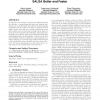Free Online Productivity Tools
i2Speak
i2Symbol
i2OCR
iTex2Img
iWeb2Print
iWeb2Shot
i2Type
iPdf2Split
iPdf2Merge
i2Bopomofo
i2Arabic
i2Style
i2Image
i2PDF
iLatex2Rtf
Sci2ools
WSDM
2009
ACM
2009
ACM
Less is more: sampling the neighborhood graph makes SALSA better and faster
In this paper, we attempt to improve the effectiveness and the efficiency of query-dependent link-based ranking algorithms such as HITS, MAX and SALSA. All these ranking algorithms view the results of a query as nodes in the web graph, expand the result set to include neighboring nodes, and compute scores on the induced neighborhood graph. In previous work it was shown that SALSA in particular is substantially more effective than query-independent link-based ranking algorithms such as PageRank. In this work, we show that whittling down the neighborhood graph through consistent sampling of nodes and edges makes SALSA and its cousins both faster (more efficient) and better (more effective). We offer a hypothesis as to why “less is more”, i.e. why using a reduced graph improves performance. Categories and Subject Descriptors H.3.3 [Information Storage and Retrieval]: Information Search and Retrieval—search process, selection process General Terms Algorithms, Measurement, Experi...
| Added | 19 May 2010 |
| Updated | 19 May 2010 |
| Type | Conference |
| Year | 2009 |
| Where | WSDM |
| Authors | Marc Najork, Sreenivas Gollapudi, Rina Panigrahy |
Comments (0)

